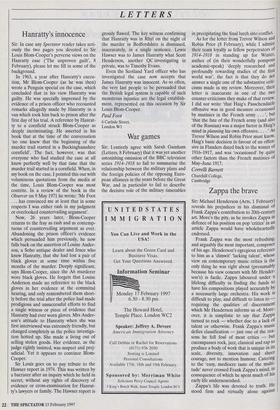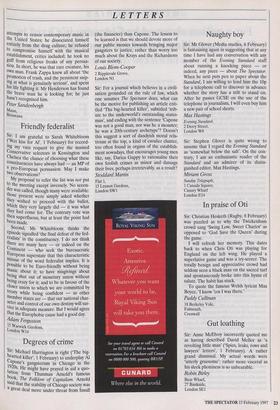Zappa the brave
Sir: Michael Henderson (Arts, 1 February) reveals his prejudices in his dismissal of Frank Zappa's contribution to 20th-century art. More's the pity, as he invokes Zappa in defence of his position on pop 'critics' in an article Zappa would have wholeheartedly endorsed.
Frank Zappa was the most refreshing, and arguably the most important, composer of his age. Henderson's egregious reference to him as a `dimwit' lacking talent', whose view on contemporary music critics is the only thing he was right about (presumably because his view concurs with Mr Hender- son's) is facile. Zappa laboured under a lifelong difficulty in finding the funds W have his compositions played accurately by a necessarily large orchestra. His work Is difficult to play, and difficult to listen to — requiring the qualities of discernment which Mr Henderson informs us of. More- over, it is simplistic to say that Zappa turned to rock — whether due to a lack of talent or otherwise. Frank Zappa's music defies classification — just one of the rea- sons he fell foul of most critics — but encompasses rock, jazz, classical and rap to produce a body of work that is unique in its scale, diversity, innovation and sheer courage, not to mention humour. Catering to the 'easy, mediocre taste of the multi- tude' never crossed Frank Zappa's mind, in consequence of which he spent much of his early life undernourished. Zappa's life was devoted to truth. He stood firm and virtually alone against
LETTERS
attempts to censor contemporary music in the United States; he dissociated himself entirely from the drug culture; he refused to compromise himself with the musical establishment, critics included; he took no guff from religious freaks of any persua- sion. In short, he was that rare creature, his cavli man. Frank Zappa knew all about 'the promotion of trash, and the persistent snip- ing at what is genuinely serious', and spent his life fighting it. Mr Henderson has found the brave man he is looking for; he just hasn't recognised him.
Peter Sandenbergh
Maun, Botswana



























































 Previous page
Previous page